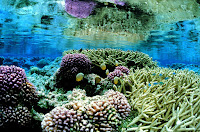Scientists say reserves can help marine ecosystems and people adapt to five key impacts of climate change: ocean acidification; sea-level rise; increased intensity of storms; shifts in species distribution, and decreased productivity and oxygen availability.
Reserves also can promote uptake and long-term storage of carbon from greenhouse gas emissions, especially in coastal wetlands, which helps reduce the rate of climate change, the study revealed.
The study, published in the Proceedings of the National Academy of Sciences, evaluated existing peer reviewed studies on the impact of marine reserves around the world.
Currently, only 3.5 per cent of the ocean has been set aside for protection with just 1.6 per cent fully protected from exploitation.
International groups are working to raise the total to 10 per cent by 2020, while delegates to the International Union for the Conservation of Nature's 2016 World Conservation Congress agreed that at least 30 per cent should be protected by 2030.
Scientists say Marine Reserves and Marine Protected Areas (MPAs):
- Protect coasts from sea-level rise, storms and other extreme weather events
- Help offset climate-change induced declines in ocean and fisheries productivity
- Provide refuges for species as they adjust their ranges to changing conditions
- Can help combat acidification

No comments:
Post a Comment